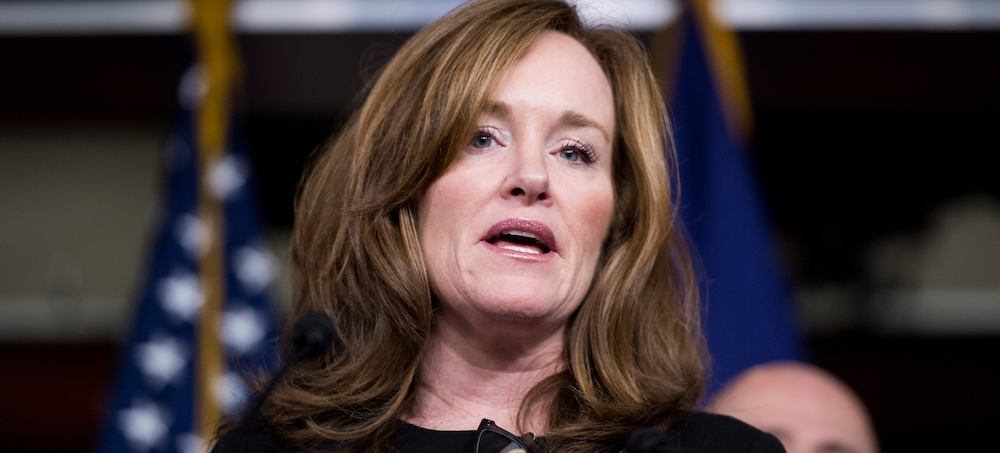Live on the homepage now!
Reader Supported News
The pharmaceutical industry wants Americans to continue paying far more for medicines than people in any other country, to protect their tremendous profits. And one of Joe Biden’s top campaign consulting firms is helping them.
While Big Pharma’s allies in Congress have already succeeded in scaling back the Democrats’ drug pricing plan, the provision in Biden’s Build Back Better legislation still represents the party’s most sincere effort to fulfill its longtime promise to allow Medicare to negotiate lower drug prices. The idea of allowing the government to negotiate drug prices — like most other high-income countries do — is one of the most popular items in the Biden social agenda bill.
Yet, a top Democratic Party media buying firm, Canal Partners Media, is placing ads for drug industry front groups that want to block Democrats from lowering drug prices as promised in the Biden reconciliation bill. One group argues that Democrats are putting rare disease patients at risk, and is targeting several incumbent Democratic senators by name. The other says Democrats are harming drug companies’ ability to respond to pandemics like COVID-19.
These fearmongering ad campaigns conveniently ignore the fact that the federal government regularly subsidizes drug companies’ research and development costs and has spent tens of billions of dollars to fund COVID vaccines and treatments.
While one of the group’s ads says they aren’t worried about corporate profits, that is exactly what these campaigns are about. The pharmaceutical industry wants to ensure that Americans continue to pay far more for medicines than people in any other country, in order to protect companies’ tremendous profits. And Democratic campaign consultants are helping them.
Canal Partners Media did not respond to the Daily Poster’s request for comment.
“Politicians Need a Win”
The Canal Partners Media website touts its work as Biden’s “lead buying agency” and its “experience championing progressive causes.”
Media Buying & Analytics, a company affiliated with Canal Partners Media, handled almost $450 million worth of ad buys for Biden’s 2020 campaign, according to OpenSecrets. Another apparent affiliate bought ads for Bernie Sanders’s 2016 presidential bid.
The firm has made media buys for official party committees, including the Democratic National Committee, the Democratic Congressional Campaign Committee, and the Democratic Senatorial Campaign Committee. They have also worked with party-aligned super PACs and progressive groups like MoveOn.
In recent months, Canal Partners Media has been buying ads for a new client: the Rare Access Action Project (RAAP), a drug industry front group that received $260,000 from the powerful drug lobby Pharmaceutical Research and Manufacturers of America (PhRMA) in 2019.
The RAAP website says its partners include the Biotechnology Innovation Organization, a drug industry lobbying group, and more than a dozen pharmaceutical companies, including Alexion, Regeneron, Sanofi, Takeda, and UCB. These companies could all potentially see some of their drug prices negotiated under the terms of Democrats’ scaled-back drug pricing plan.
RAAP’s leadership team includes several corporate consultants from Acuity Strategic Partners, as well as former Republican representative Matt Salmon, who is running for governor in Arizona.
The ad campaign from RAAP has been targeting several Democratic senators who are up for reelection in 2022: Michael Bennet of Colorado, Catherine Cortez Masto of Nevada, and Patty Murray of Washington. They’ve also targeted Bob Casey of Pennsylvania, who is up in 2024.
“Right now, politicians need a win, and rare disease patients are going to lose,” says the group’s Colorado ad. “In Congress’ rush to spend trillions, they’re putting huge cost increases on the development of treatments for rare diseases — killing research, stopping breakthroughs, and stealing hope from 25 million Americans with rare diseases. So before we let Congress score a win, think of what millions stand to lose. Tell Michael Bennet to protect rare disease patients.”
The argument that lower drug prices would significantly hinder research and development is false: A Congressional Budget Office study last year found that even if profits on top drugs decreased by 15 to 25 percent, it would only result in “a 0.5 percent average annual reduction in the number of new drugs entering the market in the first decade.” That’s because the federal government already heavily subsidizes research on virtually every drug that gets approved for sale in the United States.
There is also a lucrative incentive program under the Orphan Drug Act for companies developing drugs to treat rare diseases. An investigative report last month from House Democrats found that pharmaceutical companies have abused this program, which was meant to encourage companies to develop medicines with a limited commercial market. The report found companies are using orphan drug designations to protect and extend monopolies on “widely used and commercially successful drugs” and to “justify charging high prices.”
As for Democrats’ drug pricing provision in the Build Back Better bill, pharma-aligned Democrats have already significantly pared back the measure, saving the industry potentially as much as $450 billion over a decade. While the compromise version would allow Medicare to negotiate drug prices for the first time, it would affect far fewer drugs than what Democrats originally proposed.
The government would only be permitted to negotiate prices on a handful of the costliest drugs to Medicare each year, and only on drugs that are past their exclusivity period and have no competition. The legislation would also impose inflation caps to prevent companies from increasing drug prices far beyond what they’re charging now. That may sound promising, but prescription costs in the United States are already way too high. The measure would also not allow the government to negotiate launch prices for new drugs, so companies would likely raise those.
Of course, some drugmakers would still see their drug prices negotiated under Democrats’ limited proposal — and a number of those companies are listed as partners on RAAP’s website. According to Bloomberg Government, some of the drugs that could end up on the government’s negotiation list are sold by Alexion, Regeneron, Sanofi, Takeda, and UCB — which are all RAAP partners — as well as AstraZeneca, which owns Alexion.
“What’s at Stake Isn’t Corporate Profits”
Canal Partners Media also started buying ads late last month for the Coalition to Protect Access (CPA), another apparent pharma front group.
Business incorporation records from Washington, DC show that CPA is being led by executives from Purple Strategies, a corporate communications firm that worked with BP after the 2010 Deepwater Horizon spill as well as Purdue Pharma, the notorious OxyContin manufacturer widely accused of helping fuel the opioid crisis.
Purple Strategies wrote in a 2019 press release that the firm has been a “longtime partner” to PhRMA, a lobbying powerhouse for drugmakers that generated a staggering $573 million in revenue in 2020.
“Today, vaccines and antivirals are helping fight the pandemic, because scientists and researchers in America’s biopharmaceutical industry acted fast, after investing billions over years to achieve breakthroughs,” says the new ad from CPA. “But now, Congress is threatening legislation that will devastate private industry’s ability to fund treatments just like these. What’s at stake isn’t corporate profits — it’s public preparedness. Tell Congress to oppose legislation that would harm our ability to fight pandemics.”
PhRMA CEO Stephen Ubl made the same argument in November, claiming that Democrats’ drug pricing measure would “upend the same innovative ecosystem that brought us lifesaving vaccines and therapies to combat COVID-19.”
This is totally false: the federal government invests billions each year to subsidize pharmaceutical companies’ research and development costs, and the government has poured tens of billions of dollars into efforts to develop COVID vaccines and treatments.
Indeed, a team of government scientists helped develop Moderna’s mRNA-based COVID vaccine — a fact the company fittingly decided to leave out of the patent application for its vaccine technology.
Then there’s the newly approved COVID antiviral treatment from Merck, which “was made possible by government-funded innovation,” according to Stat News. That didn’t stop the company from charging the US government $712 per course of the treatment, or forty times the $17.74 that it costs to produce.
CPA and Purple Strategies did not respond to requests for comment.
While the public is served up TV ads warning about threats to drugmakers’ innovation, the reality of the situation is that the US government funds pharmaceutical companies’ research and development, and the industry rewards that investment by charging Americans the highest prices for medicines in the world.
Pharmaceutical companies are not losing money on their products in countries that negotiate lower prices. They only charge Americans more because they can — because US politicians barred the government from negotiating prices, while also eliminating the requirement that government-funded drugs be sold at a “reasonable price.” Companies can also game the US patent system to preserve drug monopolies even as generic or biosimilar versions are being offered in other countries.
This is why drugmakers have “targeted the United States for price increases for many years while maintaining or cutting prices in the rest of the world,” according to the recent report by House Democrats.
So far, CPA is running ads in Arizona, West Virginia, Nevada and the DC area. Arizona Democratic senator Kyrsten Sinema already played a key role in watering down the party’s prescription drug measure, while a pharma-funded front group ran ads promoting her at home.
Senator Joe Manchin (D-WV) has publicly supported the idea of allowing Medicare to negotiate drug prices, but he has pushed Democrats to stall the broader Build Back Better reconciliation bill, despite having personally negotiated down the scope of the legislation substantially.
Follow us on facebook and twitter!
PO Box 2043 / Citrus Heights, CA 95611




